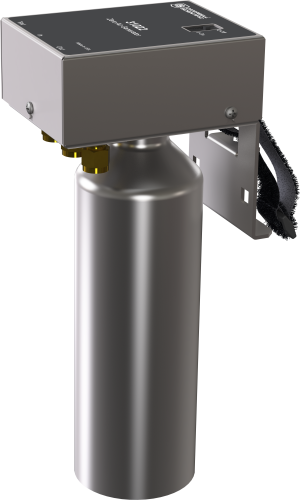
Visão Geral
The Zero Air Generator is a low-cost, handheld source of zero air (air that has been scrubbed of CO2 and water vapor) to be used for zeroing infrared gas analyzers (IRGAs). The 31022 consists of a small pump and a molecular sieve. The pump is powered by 2 AA batteries. A “Test” port located on the 31022 can be used to determine when to replace the molecular sieve.
Leia maisimagens












Descrição Técnica
The 31022 Zero Air Generator provides a source of zero air for zeroing infrared gas analyzers (IRGAs) in both open-path (zero/span shroud required) and closed-path configurations. The zero air generator contains "In," "Out," and "Test" ports, as well as a small battery-powered pump.
During normal operation, air enters the top of the bottle (via the "In" port), which is filled with a molecular sieve. The air flows (0.2 LPM) down the entire length of the bottle, where the molecular sieve removes CO2 and water. The air is pushed into the end of a tube at the bottom of the bottle and then to the "Out" port.
The "Test" port pulls the air from only partway down the bottle, 2 in. above the bottom. Because the unscrubbed air enters the top and flows downward, the molecular sieve is consumed from the top down. Comparing CO2 and water vapor from the "Test" port with the "Out" port indicates when the molecular sieve needs to be replaced.
Compatibilidade
The 31022 provides a low flow (0.2 LPM) zero air source for zeroing both open-path (zero/span shroud required) and closed-path infrared gas analyzers (IRGAs).
Especificações
| Operating Temperature Range | -20° to +50°C |
| Capacity | 750 ml (holds approximately 450 g molecular sieve) |
| Flow Rate | 0.2 LPM (typical) |
| Power | 2 AA batteries |
| Dimensions | 13.97 x 9.65 x 27.43 cm (5.5 x 3.8 x 10.8 in.) |
| Weight | 1.13 kg (2.5 lb) |
Documentos Relacionados
Perguntas Frequentes Relacionadas
Number of FAQs related to 31022: 4
Expandir todosRecolher todos
-
The bottles of sieve for drop-in replacement contain the pellets and a membrane on top. The membrane is necessary to keep the pellets contained while allowing gas to pass over the zeolite. The bottle has the same footprint as the old magnesium perchlorate bottles. The amount in each bottle is listed on the bottle. The amount of sieve needed for each analyzer is the following:
- The EC150 needs 22 g (drop-in bottle).
- The IRGASON® needs 22 g (drop-in bottle).
- The EC155 needs 22 g (drop-in bottle).
- The AP200 needs 500 g (refill).
- The 27423 needs 1000 g (refill).
- The 31022 needs 500 g (refill).
-
The molecular sieve is a direct replacement for the old magnesium perchlorate bottles. The molecular sieve may be used for any Campbell Scientific analyzer that used the old bottles.
-
The molecular sieve is a non-hazardous material that can be shipped to any country.
-
The molecular sieve has been demonstrated here by our engineering department to be effective at removing CO2 and H2O from the air sample. The change was made for two reasons:
- It was a safer alternative than using the previous chemicals.
- Increased shipping regulations for the chemicals limited the number of suppliers.